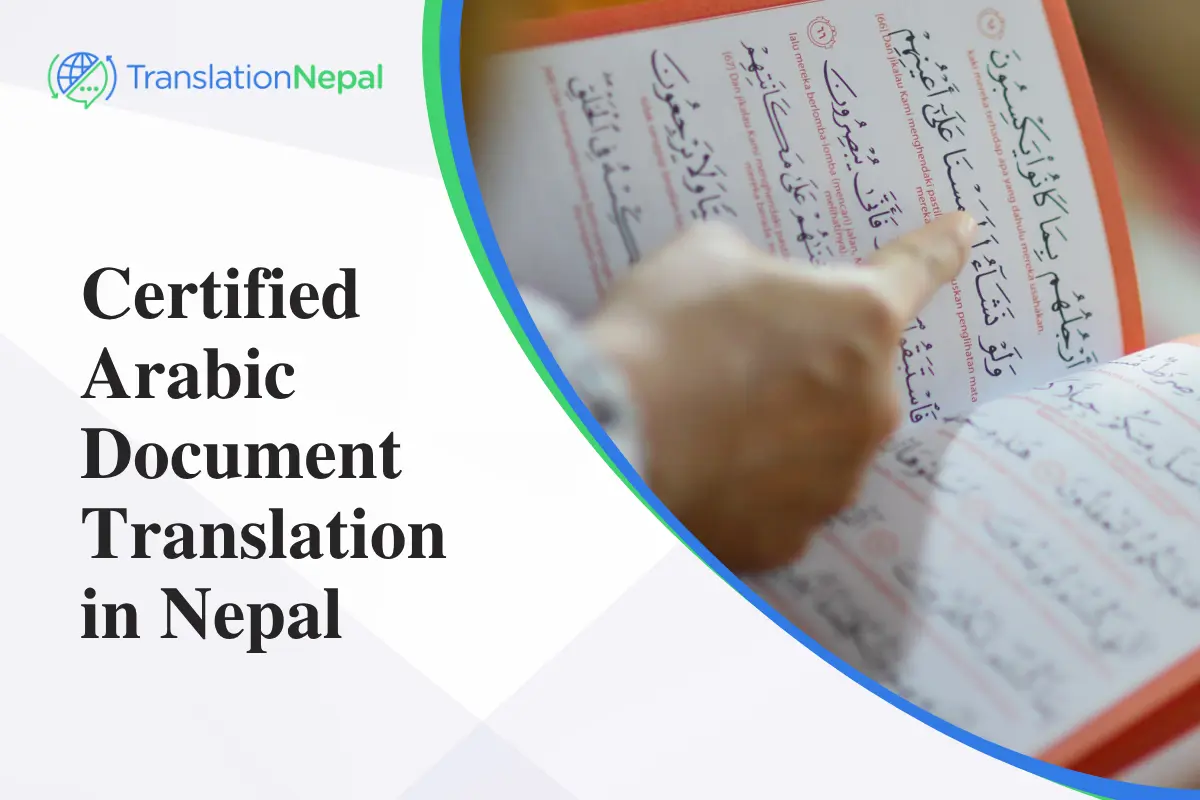
Table of Contents
Arabic Documents Translation in Nepal: Certified & Accurate Services
Introduction
With Nepal's increasing engagement with Arabic-speaking nations for trade, employment, and education, the demand for Arabic document translation services has grown significantly. Whether for business, legal, immigration, academic, or personal purposes, translating documents from Arabic to English/Nepali or vice versa is essential to ensure compliance and official recognition.
This guide explores why certified Arabic translation is necessary, what types of documents require translation, and how to get them translated and notarized in Nepal.
For professional translation services, visit Certified Document Translation Services.
History of the Arabic Language & Translation
Origin of the Arabic Language
The Arabic language is one of the world's oldest languages, originating from the Semitic language family. It has been spoken for over 1,500 years, primarily in the Middle East, North Africa, and the Arabian Peninsula. Arabic is the official language in 22 countries, playing a vital role in religion, diplomacy, and trade.
Translation in Arabic-Speaking Countries
Arabic translation has a long history, dating back to the Islamic Golden Age (8th-14th centuries), when scholars in Baghdad's House of Wisdom translated Greek, Persian, and Indian texts into Arabic. These translations contributed to advances in medicine, science, and philosophy, shaping global knowledge.
History of Translation in Nepal
Nepal has a long tradition of translation, initially focused on Sanskrit, Hindi, and English for legal, religious, and diplomatic texts. With a growing number of Nepalese working in the Middle East, Arabic translation has become crucial for work permits, visa applications, and business contracts.
Why You Need Certified Arabic Document Translation in Nepal
1. Legal & Immigration Compliance
- Required for work permits, visa applications, and residency permits.
- Essential for marriage, birth, and death certificates submitted for legal purposes.
2. Business & Corporate Transactions
- Needed for company registration, trade agreements, and financial documentation.
- Ensures legal validity of contracts and shareholder agreements.
3. Government & Embassy Certification
- Many Arabic documents require embassy-certified or notarized translations.
- Notarization ensures documents are legally recognized in Nepal and internationally.
For notarization and certification of translated documents, visit Certified Document Notarization.
Types of Arabic Documents That Require Translation
1. Legal & Immigration Documents
- Arabic Visa Application Forms
- Residency & Work Permits
- Embassy & Immigration Papers
- Marriage & Divorce Certificates
- Court Documents & Legal Affidavits
For affidavits and sworn statements in Arabic, visit Affidavits and Sworn Statements.
2. Business & Corporate Documents
- Company Registration Papers
- Arabic Business Contracts & Agreements
- Financial & Banking Statements
- Shareholder Agreements
- Tax Documents & Trade Licenses
3. Academic & Technical Documents
- Arabic Academic Transcripts & Diplomas
- University Admission Documents
- Medical & Engineering Reports
- Research Papers & Theses
- Patent Applications & Technical Manuals
For multilingual document translation and verification, visit Multilingual Document Translation & Verification.
4. Personal & Official Documents
- Arabic Birth & Death Certificates
- Arabic Family Registry
- Police Clearance Certificates
- Insurance & Legal Claims
- Driving Licenses & Identification Documents
For marriage and personal document translation, visit Foreigner Marriage Act Translation.
How to Get Arabic Documents Translated in Nepal
Step 1: Determine the Type of Translation Required
- Certified Translation: Required for official and government documents.
- Notarized Translation: Needed for court, legal, and immigration purposes.
- Embassy-Approved Translation: Necessary for visa applications and international legal matters.
Step 2: Choose a Certified Arabic Translation Service
- Work with certified Arabic translators recognized by legal authorities and embassies.
- Ensure the translation service is approved by Nepalese government offices.
Step 3: Submit Your Document for Translation
- Provide a clear scanned or original copy of the document.
- Specify the required language pair (Arabic to English or English to Arabic).
- Request additional notarization or certification if needed.
Step 4: Receive Your Translated & Notarized Document
- Review and verify the translated document for accuracy.
- Collect the final notarized and certified copy for official submission.
For notarized translation services, visit Certified Document Notarization.
Where to Find Certified Arabic Translation Services in Nepal
1. Trusted Translation Agencies
- Professional Arabic to English & English to Arabic translation services.
- Specialized in legal, academic, business, and immigration document translation.
2. Government & Embassy-Certified Translators
- Embassy-approved translations for international legal and immigration purposes.
- Certified and sworn translators for notarized translations.
3. Licensed Notary & Legal Service Providers
- Notarization and certification of translated Arabic documents.
- Legal document authentication for international submission.
For trusted translation and notarization services, visit Translation Nepal.
Conclusion
Accurate Arabic document translation is essential for legal, business, immigration, and academic purposes in Nepal. Certified translations ensure acceptance by government offices, embassies, and legal institutions.
For professional and certified Arabic translation services, consult Translation Nepal today to ensure your documents are accurate, legally valid, and properly certified.